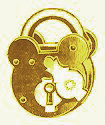 |
A Gazetteer of Lock and Key MakersJim Evansthis gazetteer is copyright Jim Evans, 2002 |
|
 |
A Gazetteer of Lock and Key MakersJim Evansthis gazetteer is copyright Jim Evans, 2002 |
|
|
J. LEGGE & CO LTD, MOAT STREET, WILLENHALL
Over the years he would add a full range of cylinder, mortice, cabinet and rim locks. The standards that were set in terms of quality products and good working conditions have been developed under the name J. Legge. In 1888 Mr Legge purchased the business of the late Joseph Collett and Sons, situated in Stafford Street,Willenhall and surrounded by vacant plots of land, which Joseph Legge with exemplary foresight, gradually acquired. Tools and patterns accumulated and the range of products was widened to include locks for buildings, cabinet locks and locks for travelling cases. The firm set up its own foundries for brass and malleable iron and, for those days a good, plating shop. By 1914, 250 people were being employed and the firms products were finding their way to ready markets in Australia, New Zealand, South Africa and India.
As a result of doing war work, the eyes of the manufacturers were opened to the increase of efficiency that could be obtained from the more extensive use of machinery. The whole trade was stimulated and, indeed almost revolutionised. The older generation of locksmiths suffered hardship during the change over in manufacturing methods; but the skill passed from the locksmith to the toolmaker and Joseph Legge was a front-runner in the changes. From 1900 Mr H Herman Chilton, as a co-director, ably assisted Mr Legge. After the 1939-45 war Mr Legge was joined in the business by three of his five sons.
In the early 1950s they started to manufacture a cylinder pin tumbler lock, the development work for which was carried out by Bernard Perrins. (C Terry 7-9-99)
The Newman Tonks organisation had previously dabbled in lock manufacture when, in 1975, they set up a lock making division in Birmingham; this was later transferred to N-T. (Oldham) Ltd (qv), Eden Works, Honeywell Lane, Oldham, Lancs, (at Oldham in April 1975). But it never produced in any quantity, mainly due to lack of expertise. It was closed in December 1976 when the lock making division was transferred back to Birmingham but production never re-commenced. Newman Tonks then set up Fleet Lock (q.v.), as a subsidiary of their Cartwright door closer division, in Straight Road, Short Heath, where they manufactured cheap, two-lever mortice locks. This manufacturing unit was later incorporated into the Erebus Company when they were acquired and moved to a new site at Lichfield Road Wednesfield. In 1989 Newman Tonks also acquired part of TESSA, a Spanish lock maker, and the USA based Falcon Locks, enabling them to sell a full range of locks to US customers. Falcon's contribution was particularly the Knob Set. In June 1994 Newman Tonks sold its majority interest in NT Harloc, based in Kentucky USA. The 85% holding has been bought by TESSA Inc., the US arm of the big Spanish lock and security manufacturers, Herrajes TESSA in which NT also have a large stake. Harloc, based in Taylorsville, assembles, packages and sells TESSA made locks and knobs, mainly into the residential building sector of the US and Canada. NT; and TESSA have agreed that TESSA should now take control of the distribution of its own products into the North American residential hardware market, allowing NT to concentrate on the contract hardware market for commercial products. NT will keep its 33.3% holding in TESSA. (Birmingham Post 15-6-94) Nov. 1994 employed approx. 270 (per Quality Questionnaire to A Hough) (Men of the Midlands-Mr Joseph Legge) The Newman Tonks organisation were taken over by Ingersol Rand in 1997 and, on the 5th May 1998, NT Legge, which was part of Newman Tonks Group Ltd, became known as Ingersoll-Rand Architectural Hardware a division of Ingersoll-Rand Architectural Hardware Group Ltd. (Letter 5 May 1998 from Ingersoll-Rand) On the 1st November 2000 the name was changed to IR Security & Safety Limited. This was in line with Ingersoll Rand Company's launch of a new identity to better reflect its product portfolio and marketing strategies. The most dramatic change was that altering the corporate name from Ingersoll Rand Company to IR Company. (IR Architectural Hardware letter 27 October 2000) |